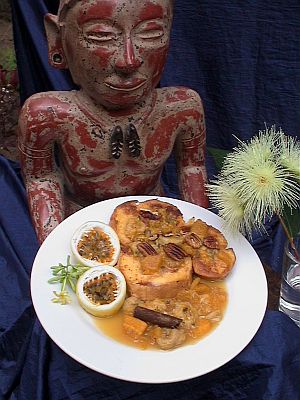Puerto Vallarta, Mexico - Traditional indigenous uses of passionflower include its use for dysentery (diarrhea with stomachache), neuralgia (aching nerves), painful menstrual cycles, heart palpitations, mental fatigue, and high blood pressure.
Locally, people make a tea to relax or to sleep by gently simmering a handful of passionflower leaves and flowers in 4 cups of water for 15 minutes. Strain the mixture and drink hot.
The dried aerial parts of passionflower (Passiflora incarnata) are a sedative. They are effective for tension, the nerves, and insomnia. An infusion (tea) made from the branches, leaves, and flowers acts as a sedative due to the presence of the alkaloid harmaline. An extract containing passionflower and hawthorn has been studied as a possible treatment for shortness of breath and difficulty exercising in patients with congestive heart failure.
Did you know that when the Spanish arrived in Mexico they named the plant "Passion flower" because the flower reminded them of the passion of Christ?
The crown of the flower represents Christ's crown of thorns, the 5 sepals and 5 petals represent 10 of the 12 disciples (Peter & Judas are not represented) and other parts of the plant represent the marks from the nails and his other wounds.
Recipe: Hot Passion Fruit Sauce for Yogurt, French Toast, or Pancakes
Ingredients:
2 apples
6 passionfruit (fruit pulp and seeds)
1/4 cup water
2 bananas
1 tablespoon honey
2 oranges
1/4 cup of crushed pecans
Cut the apples, bananas, and oranges into small pieces.
Put into a saucepan with the water and gently simmer until the fruit begins to liquefy.
Do not boil the mixture! After ten minutes, add the passion fruit in and cook for another 3 minutes. Turn off the heat and add the tablespoon of honey.
Serve hot over yogurt, or freshly cooked French toast or pancakes. Garnish with pecans.
This recipe is appropriate for people with diabetes when the honey is omitted.
Copyright © 2012 by Leslie Korn, PhD, MPH All Rights Reserved
 Dr. Leslie Korn specializes in integrative mind body medicine for the treatment of PTSD and chronic illness. She did her graduate training at Harvard Medical School where she introduced bodywork to the department of psychiatry and conducted ethnobotanical research on Papaya. She began her research in Cabo Corrientes in 1974, and was a 2009-2010 Mexico Fulbright scholar. She currently divides her time between PV and Washington. To learn more about her work, visit DrLeslieKorn.com.
Dr. Leslie Korn specializes in integrative mind body medicine for the treatment of PTSD and chronic illness. She did her graduate training at Harvard Medical School where she introduced bodywork to the department of psychiatry and conducted ethnobotanical research on Papaya. She began her research in Cabo Corrientes in 1974, and was a 2009-2010 Mexico Fulbright scholar. She currently divides her time between PV and Washington. To learn more about her work, visit DrLeslieKorn.com.Click HERE to read more articles by Leslie Korn.



